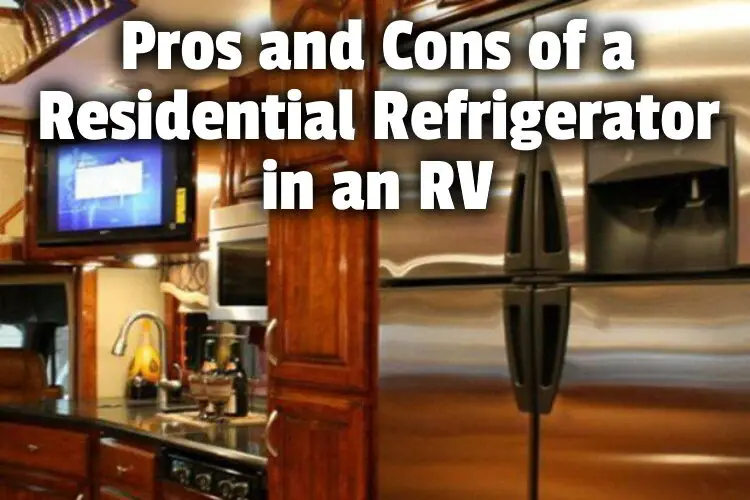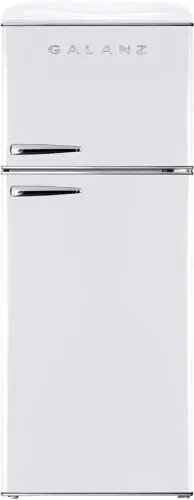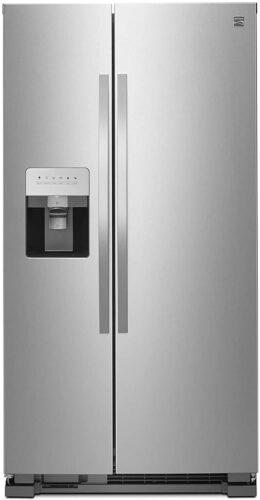Most RV owner’s biggest complaint is the tiny fridge. It doesn’t hold very much, and it lacks the functionality of the fridge you have at home. But even if you could put a regular fridge in your RV, what are the pros and cons of a residential refrigerator in an RV?
Pros of a residential refrigerator in an RV:
- More storage space
- Better temperature control
- Less expensive to replace
Cons of a residential refrigerator in an RV:
- Most won’t fit in the space available and require modification
- They won’t typically run off the available battery power and may require additional power sources
- They do not have a locking mechanism to keep the door shut while driving
But that’s not all there is to know about having a residential refrigerator in your RV. In this article, we’ll cover all of the nitty-gritty when it comes to having a residential refrigerator in your RV.
So, let’s dive in!

Can you run a residential refrigerator in an RV?
A residential refrigerator can work just fine in an RV. But there will not be an available plug to connect them, requiring an electrician to connect it to a power source, and the space for the refrigerator may require modification to enable it to fit.
Unlike standard RV refrigerators, residential refrigerators use a compressor to keep contents cold and AC power to run.
This means that residential refrigerators need a constant power supply. Power can come from a pole, like at a campground, RV park, or home. Power can also come from a generator or a power bank using an inverter.
Things can get tricky if you’re boondocking.
When you’re boondocking and using solar energy, a residential refrigerator requires a significant battery bank and solar array to power it. Otherwise, the only time your fridge will have power is if you run the generator.
RV refrigerators, on the other hand, often get power both from batteries, generators, or shore power but also from the propane tank. A residential refrigerator won’t be able to operate that way.
That means ALL the power has to come from batteries or the generator (or shore power).
On the plus side, residential refrigerators are not as level-sensitive as standard RV refrigerators. They also have better temperature precision and cooling accuracy. They also have modern fridge features and far more inside space.
There are a few things you need to consider when picking a fridge for your RV.
Make sure that you pick one that will fit as close as possible in the existing space. Unless, of course, you are comfortable with your carpentry skills. The direction of the door opening should match the existing door swing.
Determine how to remove the existing unit from the RV as well as how to get the new fridge in the rig. It may require that you remove the entrance door or even a large window.
You will also need a dedicated 120 VAC 15-amp breaker and line from the panel. If you have an ice maker, you’ll need a water supply line and a shut-off valve.
Finally, make sure to have adequate space for airflow over the condenser tubing at the rear of the unit.
Cooking on the road is easy with our Coachmen RV! This RV has a variety of amenities, including a microwave, stove, and refrigerator. #motorhome #camper #vanlife pic.twitter.com/NDz9l3WL2d
— Mid Florida RV Rentals (@midflrv) March 19, 2020
How long will residential refrigerators last in an RV?
Residential refrigerators tend to function for close to 20 or more years, and typically have a longer lifespan than RV refrigerators. RV refrigerators have an average lifespan of about 10-15 years.
In addition to a longer lifespan, residential refrigerators are also cheaper to fix. It’s easier to find parts for them, and there are more available people to do repairs.
Keep in mind that residential refrigerators weren’t really designed for travel. All that bouncing around may shorten their lifespan compared to what you might expect when using one in a house.
RV refrigerators can stop working for a variety of reasons.
They can lose power when the propane runs out. If your RV isn’t connected to shore power, it can drain the batteries, causing the refrigerator to lose power.
It could be a blown fuse or even a bad control board.
But there are a lot of other reasons that an RV refrigerator might not work. Check out this recent article to learn all the potential reasons your RV refrigerator may not be working.
Just click the link to read it on my site.
Taking with Rockpals RV refrigerator, you would be able to make your beverage cold and food fresh. Our RV refrigerators are designed to bring power for you, You could eat fresh and tasty food anywhere!
#Rockpals#RV refrigerator#vanlife#PowerOutdoors#energy#Lake trip#power station pic.twitter.com/kS3Y4olqrF— Rockpals (@rockpals) February 3, 2021
Will a residential fridge in an RV run on battery power?
Residential refrigerators need 120-volt electricity. They can run off of battery power with an inverter. So, in campgrounds with 30 or 50 amp shore power, the refrigerator will operate perfectly. Boondocking, on the other hand, can drain batteries quickly when using a residential refrigerator.
Residential refrigerators use a compressor to cool down the interior and keep the temperatures low. The compressor requires a constant 120-volt AC power source.
This isn’t a problem if you’re connected to shore power with 50 amp electric hookups. If you’re driving or dry camping for any length of time, an alternate power source is vital.
So, it can run off of battery power if you have an inverter and an extra battery pack. Inverters change the 12-volt battery charge into 120-volt power.
This will allow your refrigerator to keep cold while driving or boondocking.
Solar panels and generators will also provide power to your residential refrigerator when the rig is unplugged from shore power.
As an RV owner, you probably know that most RVs have a battery for the motor, just like a car battery. But they also have a battery, or even multiple batteries, to power the inside of the RV too.
These batteries are called “house” or “coach” batteries.
The chassis battery provides power to start the engine and run automotive items, like the windshield wipers and vehicle lighting.
The coach battery is what provides the 12-volt DC power to operate non-engine electrical accessories, like interior lighting. This cannot be used to power a residential refrigerator.
To read more about the differences between the coach and chassis batteries, read this recent article.
Just click the link to read it on my site.
Tired of finishing everything in the fridge before going on a trip? Tip: an RV has a refrigerator where you could transfer your food! pic.twitter.com/79EPUkxUs3
— TWFG Insurance Services Idaho (@IdahoTwfg) September 18, 2021
Top Pros of Using a Residential Refrigerator in an RV
RV refrigerators tend to be very small and often have trouble maintaining their temperature. This means more trips to the market to replenish perishable foods. These are just a few reasons people prefer residential fridges over RV fridges in their RV.
Let’s review the pros of using a residential refrigerator in an RV in greater detail:
-
Greater storage capacity
Typical RV refrigerators are almost always smaller than residential refrigerators. This means less room for food, drinks, and perishables. Less frequent trips to the market mean you can stay at that fabulous boondocking spot for a long time.
-
Better temperature control
RV refrigerators can be temperamental. Changes in ambient temperature, problems with gas or electricity, or a number of other factors can impact the temperature. Even if you consistently use the same settings on the fridge, temperatures can vary widely.
Residential refrigerators are much better at regulating temperatures. Both the fridge compartment and the freezer will stay properly cold all the time. This means less adjusting of the temperature and no more soft ice cream.
-
Less affected by outside temperatures
Residential refrigerators have great insulation, making them almost unaffected by outside temperatures. This makes them cool down faster and maintain a consistent temperature, regardless of the ambient temperature.
RV refrigerators are very finicky. Parking in the wrong direction or in the sun on a hot day can cause the temperature to creep up. Even traveling too high up a mountain can affect the temperature of your RV fridge.
-
Cools down faster when powering up
Standard RV refrigerators may need to be running for at least 24 hours before it cools down to an adequate temperature. On the other hand, residential refrigerators cool quickly. When the compressor kicks on and cold air begins to circulate, it begins to cool down.
By the time you have everything else in your RV ready to go, you can stock your fridge and hit the road. With a traditional RV fridge, you’d have to remember to power it up at least the day before you’re ready to leave.
-
Lasts longer
Residential refrigerators last upwards of 20 years or more. If you’re lucky, traditional RV refrigerators might last 15 years. And the lifespan depends largely on how well the unit is maintained and used.
Residential refrigerators not only last longer, but they are easier to maintain and cheaper to repair.
-
Less danger of fire
RV refrigerators typically use a propane burner or ammonia to stay cool. This is a potential fire hazard. From 1997-2010 a number of Norcold refrigerators were installed in countless RVs. They were recalled several times due to thermal problems that led to fires.
While it’s not a major issue, a fire caused by the refrigerator would not be a fun thing to wake up to in the middle of the night. Residential refrigerators are powered by electricity, effectively eliminating any chance of fire caused by the refrigerator itself.
the pizza box wouldn’t fit in the rv refrigerator… pic.twitter.com/4rVKPy0UHJ
— yung midoriya 🌵 (@asuki_ara) September 18, 2021
Top Cons of Using a Residential Refrigerator in an RV
The most obvious con is that residential refrigerators can make boondocking more complicated. They also require a bit of modification to both the RV and the fridge itself.
Residential refrigerators run off of electricity and do not have a propane setting. They are also much larger than RV refrigerators, meaning you may have to make space for the refrigerator.
Let’s review the cons of using a residential refrigerator in an RV in greater detail:
-
Usually have to move/remove cabinets to allow for the added space of the larger refrigerator
A residential refrigerator is much larger than a typical RV fridge. You’re going to have to do some modifications to the RV.
You’re going to have to cut a larger hole, remove cabinets, or even fill in gaps with new cabinetry. You might be able to just move some cabinets around. The bottom line is that it’s going to take some work to get the new refrigerator in.
-
They lack a latch to keep doors closed while driving
RV refrigerators come with a latch to keep the doors closed while driving. Residential refrigerators obviously don’t come with a handy latch.
But if you’ve been RVing for any amount of time, you know those latches fail frequently anyway. A bungee cord is a simple, inexpensive alternative to a latch. That’s what I use on my fridge (which has a latch that works terribly).
-
May not be able to run off existing batteries or generator when boondocking
If you’re boondocking, you may not be able to run your residential refrigerator off of the existing batteries. Residential refrigerators don’t run on propane, after all.
In this case, it may be necessary to upgrade your batteries and/or your generator.
If you’re living in your RV full-time, you may decide to upgrade your batteries or generator, anyway.
Full-time RV living can come with the freedom to move whenever and wherever you want. But it also means being away from friends and family.
Check out this recent article to read all about the pros and cons of full-time RV living. At least if you have a residential refrigerator, you won’t have to go to the grocery store so often.
Just click the link to read it on my site.
There’s “RV refrigerator” talk happening on our #RVillage Community!
How do you keep your food organized & stop it from shuffling around on the road? JOIN THE CONVERSATION! https://t.co/YKcmj2REvP #RVtips #RVlife #RVtravel #RVliving pic.twitter.com/WHlv8Tzx74
— RVillage (@RVillageTeam) May 29, 2019
How long do RV refrigerators last compared to residential refrigerators?
RV refrigerators have an average lifespan of about 10-15 years. Residential refrigerators tend to function for close to 20 or more years.
Installing residential refrigerators in RVs is a relatively new idea.
So, while they can last 20 years or more when in a house, they weren’t really designed for travel. All that bouncing around may shorten their lifespan compared to what you might expect when using one in a house.
Residential refrigerators are made of less sturdy materials than RV fridges. All the bumping and jostling around will eventually take its toll. There are more internal parts, which can increase the chance of malfunction.
So, when all is said and done, your residential fridge may have a similar lifespan to your RV refrigerator.
What you should think about is not just how long it will last but the cost of repairs, the cost of fuel versus the cost of electricity, and how many trips to the grocery store you want to make.
The storage capacity of a residential refrigerator far exceeds that of an RV refrigerator. More space is the primary reason why most RV users choose a residential fridge over an RV fridge.
Another reason is that residential fridges keep food consistently cool, and the freezer keeps food solidly frozen.
If you’re satisfied with the storage capacity, don’t mind soft ice cream, and aren’t worried about fuel, then you may just want to keep that RV refrigerator.
We’ve gone out of our way to research & select a combination of quality appliances we believe you will find nowhere else! From the European style of our cooktop to our 3.1 cubic foot refrigerator and convention micro we choose only the best! #dreamsdocometrue #livinginfirstclass pic.twitter.com/cmrmj9FWhf
— Regency RV (@Regency_RV) November 8, 2018
What is the best residential refrigerator for an RV?
The best medium-sized residential refrigerator for an RV is the Galanz Dual Door Refrigerator which doesn’t require as much battery power as other models. For a large-sized residential refrigerator, the best option is the Kenmore 36″ side-by-side refrigerator and freezer.
Everyone’s refrigerator requirements are going to be different. Smaller or medium-sized refrigerators are going to be better for RVing in a van or truck camper. Larger models will work well in a Class A motorhome or 5th wheel.
With all the great options out there, it can be hard to decide which refrigerator is the best one for you and your situation. That’s why I’ve done all the leg work for you.
Below are my top picks for medium-sized and large-sized residential refrigerators.
Medium Sized Residential Refrigerator
The Galanz Dual Door Refrigerator on Amazon is a cool option for smaller RVs. At 12 cubic feet, this dual door fridge has a top-mount freezer and electric thermostat control.
It has a nice large capacity without taking up a lot of space in your RV. It comes with removable glass shelves and separate drawers for fruits and vegetables.
The compressor is very efficient and consumes less energy.
This means it won’t use quite as much battery power as a less efficient refrigerator. Because it doesn’t have an ice maker, you won’t need to worry about installing water lines.
As a bonus, it’s got a classic, retro look to it. This retro look is perfect for older model RVs, especially if your old RV refrigerator has gone kaput.
CLICK HERE to see the latest price on Amazon.
Large Size Residential Refrigerator
The Kenmore 36″ side-by-side refrigerator and freezer on Amazon is an excellent choice for newer Class A motorhomes.
The stainless steel will look great in any motorhome.
Because it is a residential refrigerator, it has all of the amenities of a home. It has a 25 cubic feet total capacity, ice maker, and water dispenser.
The shelving is adjustable and easy to clean. The doors have gallon-sized bins for taller, wider items, like milk jugs and wine bottles.
These handy door bins will keep larger items from sliding around or breaking.
Even though it has a lot of space, it’s also compact, making it perfect for smaller spaces, like RVs.
Finally, being a side-by-side refrigerator makes it easier to secure. Simply use a nice tight bungee cord to hold the doors closed while the RV is in motion.
CLICK HERE to see the latest price on Amazon.
Final Thoughts
With some careful planning, a residential refrigerator can be installed in an RV.
Having a residential refrigerator is ideal if you are hooked up to shore power, a home, or using a generator. It’s also doable while boondocking, with upgraded batteries.
There isn’t really much of a downside to installing a residential refrigerator in your RV. Enjoy the extra space and time you’ll get with your family since you won’t be spending so much time at the grocery store!
Will you be installing a residential refrigerator in your RV?
Photo which requires attribution:
Have you ever seen an #RV with a full-size fridge? by Ark PP is licensed under CC2.0 and was cropped, edited, and had a text overlay added.
Middle Class Dad is a participant in the Amazon Services LLC Associates Program, an affiliate advertising program designed to provide a means for sites to earn advertising fees by advertising and linking to Amazon.com. As an Amazon Associate, I may earn a small commission from qualifying purchases if you click to Amazon from my site and choose to make a purchase. This is no way increases the cost to you.


